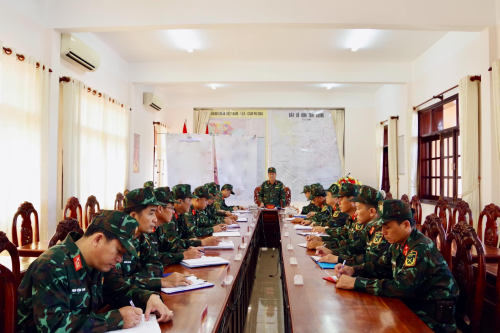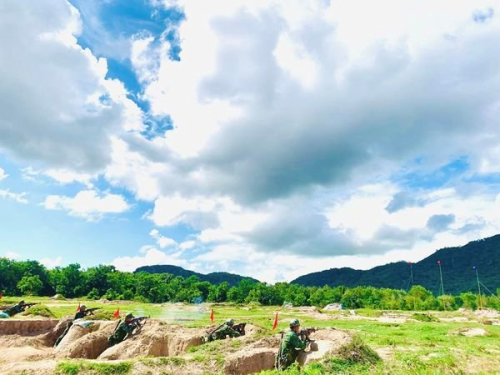In the final years of the resistance war against US imperialists, in response to the urgent demands of the battlefield, particularly in the southwestern region, Infantry Division 4, under Military Region 9 (hereafter the Division) was established on 19 August 1974. Immediately upon its foundation, the Division strengthened its organisational structure, building up its forces, engaging in remarkable combat operations with outstanding feats of arms. Notably, it successfully launched offensive campaigns to eliminate the enemy’s Hung Long military sub-zone, occupy Tactical Zone 4’s Command of the puppet regime, and take control of the enemy’s key headquarters in Can Tho city. After the reunification of the country, the Division combined economic development with defence efforts, reclaiming and rehabilitating thousands of hectares of land in the Southwest, while successfully fulfilling its mission in the war to defend the country’s southwestern border.
 |
| Combat resolution approved during the exercise of 2023 |
Over the course of 50 years of construction, combat, and growth, despite organisational restructurings and name changes, generations of the Division’s cadres and soldiers have consistently demonstrated their unwavering loyalty to the Party, the nation, and the people, overcoming countless difficulties and challenges to successfully complete all assigned tasks. In recognition of their outstanding achievements in combat, nation-building, and national defence, the Division and five affiliated units were honoured with the title of Hero of the People’s Armed Forces by the State; 24 Military Exploit Orders, 1248 Feat of Arms Orders, and many other prestigious accolades were given to various collectives and individuals of the Division.
At present, the Division serves as a unit mainly staffed by cadres and tasked with building and training reservists, managing, protecting and conserving forests under the Government’s Project 661. To fulfil these tasks amid a reduction in its workforce, a large area for reserve force development, and a wide expanse of forest under its management and protection, the Division has, in recent years, focused on making itself “exemplarily, typically” comprehensively strong as the foundation for enhancing its synergy and combat strength, continuing its heroic tradition in a new era.
First, the Division has concentrated on making itself politically strong. This is the most crucial factor and serves as the basis for boosting the combat strength of each unit. For the Division, this is even more significant given its status as a unit mainly staffed by cadres with downsizing, limited and deteriorating facilities, and ideological issues relating to career development among some cadres. In response to these challenges, the Division has paid attention to effectively conducting political and ideological education, enhancing the effectiveness of Party and political work across all activities.
To do so, the Division has directed its agencies and units to thoroughly grasp, concretise, and implement the project on “Reforming political education within units in the new period”, with a focus on Directive 2423-CT/QUTW dated 9 November 2023 by the Central Military Commission on “Renewing and improving political education in the new period”. In this regard, importance has been attached to updating the content, methods, and forms of education to suit the specific tasks and perception of each target group. The educational content has been centred on clarifying tasks and traditional values of the Military Region and Division, exposing hostile forces’ strategies of “peaceful evolution” and “depoliticisation” of our Army, introducing the fundamentals of the Law on Reserve Forces. Alongside education, the Division has attached great value to fostering the vanguard and exemplary role of cadres and Party members through specific actions, thereby promoting great unity, responsibility, and determination to successfully accomplish all assigned tasks among its troops.
Party building is the cornerstone of developing a politically strong unit. Therefore, the Division has consistently focused on strengthening the leadership capacity and combativeness of Party committees at all levels. The Division has centred its efforts on building and rectifying the Party in accordance with the Resolution of the 4th Plenum of the 13th Party Central Committee, aimed at building typically pure, strong Party organisations and cells at all levels. Over the time, the Division has taken numerous measures to raise the quality of holding party meetings and issuing and realising resolutions, particularly at grass-roots level. As a result, the principles of party organisation and activities, especially democratic centralism, have been firmly upheld. The practice of self-criticism and criticism has been enhanced and made more substantive. Offices and units within the Division have effectively carried out ideological work, opportunely preventing and resolutely combating negative manifestations to ensure internal purity. Concurrently, due regard has been paid to executing Conclusion 01-KL/TW, dated 18 May 2021 by the Politburo on continuing to accelerate the study and following of Ho Chi Minh’s thought, ethics, and lifestyle in tandem with the “Determined to Win” emulation movement and other ones. Timely commendation and rewards have been given to collectives and individuals with outstanding achievements, thus encouraging cadres, party members, and soldiers to strive for self-improvement and training. Consequently, annually, over 90% of the Division’s cadres and Party members have successfully fulfilled their duties.
 |
| Training to shoot aerial targets by infantry guns |
To enhance its synergy and combat strength, the Division has made significant strides in improving the training and exercises of reserve forces. Based on the Central Military Commission’s Resolution 1659-NQ/QUTW, dated 20 December 2022 and Military Region 9’s Resolution 797-NQ/ĐU, dated 29 March 2023, the Division’s Party Committee issued Resolution 1261-NQ/ĐU dated 25 April 2023 on “Raising the training quality from 2023 to 2030 and beyond”. Accordingly, the Division’s Party Committee and Command have required all units to prioritise improving cadres’ skills before starting any training programs. The Division has also proactively prepared training materials and grounds in accordance with real-world conditions and curriculum requirements.
As training courses for reservists often take place in a short period of time, with a low frequency and diverse groups of reservists in terms of age, health, and educational background, the Division has adopted the principle of “basic, practical, and effective” training, coupled with the requirements of “speed, strength, and accuracy”. Special emphasis has been placed on night training, realistic combat training in riverine areas, fire, explosive, and forest fire prevention and control training, disaster response training, and search and rescue training. Significance has been attached to actively innovating training content and methods, with tactical training as the centre and technical training as the cornerstone to ensure troops’ proficient use of weapons and equipment in the inventory. Units in charge of training new soldiers have intensified training courses on discipline, physical fitness, individual and squad-level combat tactics, and basic infantry combat techniques. Simultaneously, the Division has directed agencies and units to effectively prepare documentation, personnel, and material resources for reservist mobilisation and forest fire drills as well as for participation in defensive exercises. The work of inspection, review, and evaluation of training and exercises has been conducted rigorously to opportunely rectify shortcomings and reward excellent collectives and individuals. As a result, the Division has consistently completed 100% of its training content and programs annually, with good results. Battalion 4 (a full-strength unit) under Regiment 10 have been recognised as an excellent training unit for many consecutive years; all agencies and units have guaranteed the absolute safety during their training and exercises.
Alongside training work, the Division has proactively cooperated with local authorities in building and managing reserve forces. Priority has been given to re-examining and maintaining human resources for mobilisation and organisation of reservist units. Thanks to coordination work, all reservist units have been staffed with a strength rate of 99.82%. The rate of reservists participating in annual inspections of mobilisation readiness, combat readiness, training, and exercises has always been above 95%.
Advocating that regularity building and discipline management serve as the objective and foundation of the building of an “exemplarily, typically” comprehensively strong unit, the Division has mandated its agencies and units to strictly maintain military regulations, adopt a modern, disciplined work style, and enhance the overall environment. Concurrently, agencies and units have been tasked with raising public awareness and a sense of responsibility among cadres, soldiers, and reservists towards State laws, military regulations, and unit rules. Regularity building and discipline management have been closely integrated with the cultivation of a healthy cultural environment, encouraging troops to voluntarily adhere to daily and weekly activities and procedures. Serious violations of discipline, traffic safety, training safety, fire and explosive prevention regulations have been strictly handled. As a result, the quality of regularity building and discipline management has steadily improved in recent years. Cadres, soldiers, and reservists’ awareness and sense of responsibility have been heightened, with the rate of common disciplinary violations remaining below 0.3%, no case of desertion, no serious disciplinary offenses, and no traffic accidents by subjective reasons.
In addition to those aforementioned solutions, the Division has concentrated on ensuring effective logistics and technical support for its tasks. Offices and units have invested in improving forested land for fruit cultivation and organising various productive agricultural models with proven effectiveness. They have proactively, opportunely, sufficiently ensured all necessary provisions for reservists during training periods in accordance with regulations. As a result, the Division is now largely self-sufficient in vegetables, meat, and fish for its troops’ improved living standards. Furthermore, the Division has prioritised maintaining technical readiness for all tasks, particularly in mobilisation, training, combat readiness, exercises, and forest fire prevention. Strict adherence to maintenance and preservation protocols has been observed, with ongoing efforts to research and conduct technical improvements to extend the lifespan of weapons and equipment.
Upholding its glorious tradition, the Division is determined to make itself “exemplarily, typically” comprehensively strong and capable of successfully accomplishing all tasks in the new era.
Sr. Col. DO MINH NHAN
Commander of the Division